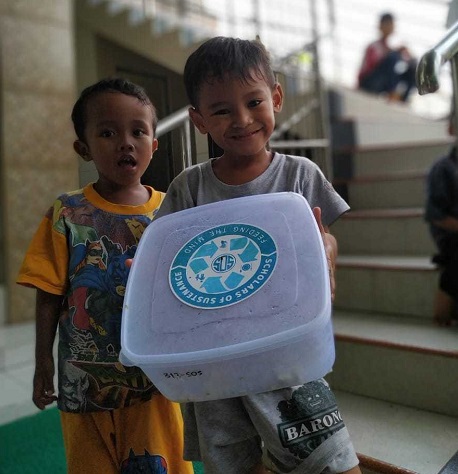In Bali, millions of tourists visit every year – and they waste tonnes of food while they are there. Leftovers from spicy banquets, over-provisioned picnics and un-sampled buffet breakfasts all add to the waste. But one smart tech entrepreneur has swapped his skills in cash handling to food handling – and helped feed hungry villagers in the process. By DJ Denton and Jeremy Torr.
Thanks to SOS, hotel waste becomes village sustenance. Courtesy SOS
Denpasar, Bali. 4 September 2019. It is a fact that the world easily produces enough food to feed everybody on the planet. Yet 16% of the global population still suffers from malnutrition or hunger. That means that one out of seven billion people go to bed hungry, and that enough food for four billion people is wasted on a daily basis. To add to this sad statistic, over 30% of the food produced on our planet ends up in landfill, creating tonnes of methane gas as it decomposes, which is very harmful to the environment.
In tourist destinations like Bali, this imbalance is thrown into stark relief by the proximity of the most extreme excesses of the established tourism industry with its millions of rich arrivals, close alongside poor villagers with barely enough to get by. But things are changing.
Bo Holmgreen used to manage cash transactions, but now manages food transactions instead. Courtesy SOS.
“Big corporations, hotel kitchens and food suppliers are becoming more aware of the environmental impact of food waste,” says Bo H. Holmgreen, serial IT entrepreneur and founder of Scholars of Sustenance (SOS). In his role as globe-trotting businessman, he often travelled in Southeast Asia and stayed at luxury hotels, where wasteful buffet spreads were a daily offering. Instead of only wastefulness, he saw an opportunity to take what was an otherwise "useless" resource and turn it into a very valuable commodity.
So he set up SOS, initially in Bangkok, to work with various community organisations such as orphanages and other foundations in the distribution of otherwise wasted food. Today, the SOS team works hand in hand with hotels, retailers, commercial outlets, farmers, suppliers and other businesses that have the potential for surplus food disposal.
Waste food is carefully selected, tested and prepared for distribution. Courtesy SOS.
SOS then designs customised logistic supply and quality control systems to assure the internal policies and procedures of the donors are not interrupted, or that the local licensing and compliance regulations are not contravened.
“I am always shocked to see how beautiful the food is – totally edible, good food that otherwise would go to landfills. So, we call it the S.O.S. magic where we take nothing and turn it into something,” said Holmgreen in a recent interview. Thanks to its unique approach, SOS International is now rescuing well over two tonnes of edible food a day.
But the organisation has gone even further than just cutting waste and feeding hungry people. It is also dedicating its resources to improving the lives of poor villagers in a long term way.
“Education has always been a priority for me and many of our food recipient communities hold some very bright kids with no chance to ever be able to go to college,” says Holmgreen. So, working with local elders and officials, SOS identifies adolescents who have dropped out of school due to financial, hardship or food-based issues. These young people are then tasked with helping to distribute SOS’s surplus food to the most needy locals near their homes. They work in a "Kampung" program in the northeast of Bali, making sure collected food gets to those who need it most by working with local Priests, Banjars, Police, and Schools.
Orphanages, schools and villages all benefit from the SOS food. Courtesy SOS.
“Helping us with the distribution of the food means we can credit these young people with points based on their capability, reliability, motivation and basic skills,” notes SOS. And then, with the help of village authorities, SOS can get them back into school by paying for their education. The SOS scholars get their school fees paid from middle/junior high school all the way through to university. They also get a living allowance, petrol allowance, phone credit and so on. And most will be able to save a small "nest egg" which will usually flow back into their local community. It’s a win-win result.
“If you think food distribution remains an important issue for the world's poor, if you feel this incredible waste needs to be reduced, if you see excess food thrown away, if you fear what the landfill pollution and gases emissions will do to our world .... and if you think your country should be next to benefit from SOS Food Rescue programs, please contact us,” says the SOS website. Sign up now.



